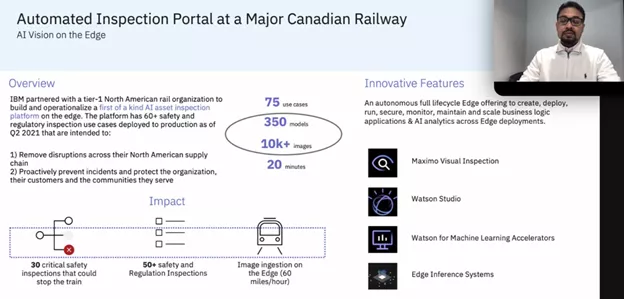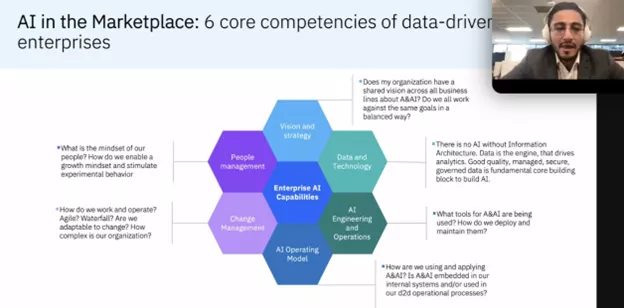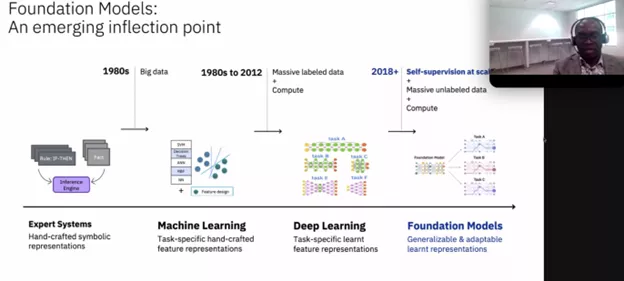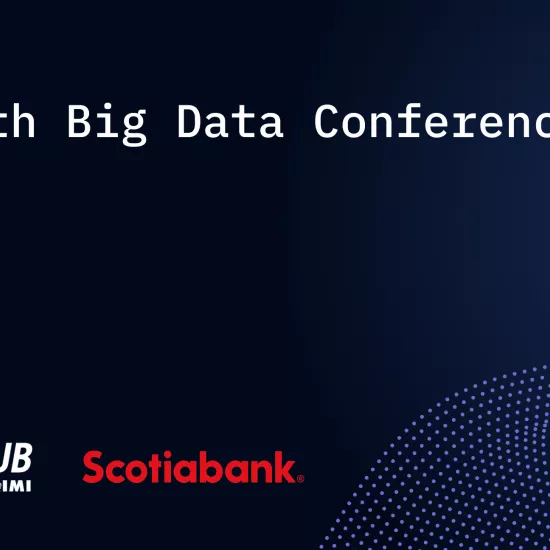AI in Practice with Ashek Mahmood, Nizar Mohamed, and Omolade Saliu

On January 31st, 2023, a team of Data, AI & Analytics consultants from IBM presented the fourth seminar in the 2022-2023 IMI BIGDataAIHUB’s Seminar Series on digital transformation and bringing AI into practice.
The seminar began with speaker Ashek Mahmood who discussed case studies of digital transformation, where AI can enhance business processes. The second portion of the seminar was presented by Nizar Mohamed, who shared the evolution of AI strategy and six core competencies of data-driven organizations. Next, Omolade Saliu discussed the evolution of AI technology. Finally, the three presenters facilitated a time of Q&A for attendees.
01| Case studies

A) Automated Inspection Portal at a Major Canadian Railway
IBM built and operationalized an AI asset inspection platform for a Canadian railway company/ This platform helped removed disruptions in the supply chain, and proactively reduce incidents, which increased safety and reputation for their customers and the organization respectively.
B) Data Platform Transformation at a Large Canadian Airline
This three-phase project sought to create a Strategy & Roadmap for over ten lines of business and 15 data domains within a major Canadian airline. In phase 2 IBM assisted with the migration of a legacy platform for a new data platform. In phase 3, IBM launched a multi-stream data modernization program to ensure organizational alignment.
C) Experience Transformation at Canada Post
One of the top priorities of this transformation was providing hybrid customer service (both digital and in-person), given the talent shortage faced by the industry. Here, AI helped enhance service by addressing more straightforward customer issues, leaving customer service personnel to address more complex issues. This was accomplished through chatbots that are trained to answer a specific set of questions. Innovative features include seamless agent escalation to a live agent, integrations with existing backend services, a multi-bot solution, hat capability through a mobile app, and service ticket integrations that can be submitted directly b customers through the chat feature.
02| The Evolution of AI Strategy

6 core competencies of data-driven enterprises
Nizar Mohammed described six essential competencies and corresponding questions to ask an organization to determine if they are a data-driven firm.
- Vision and Strategy: does my organization have a shared vision across all divisions about AI?
- Data and Technology: is my organization using good quality, well-managed, and securely governed data as the foundation of building AI?
- AI Engineering and Operations: what tools for AI are being used, and how are they deployed and maintained?
- AI Operating model: how does AI fit into our existing business process?
- Change Management: how does AI fit into the way we work and operate?
- People Management: what is the mindset of our people? How do we promote a growth mindset and a culture shift that is necessitated by new tech?
03| The Evolution of AI Technology

Omolade Saliu discussed the evolution of foundational models, beginning with expert systems in the 1980s, to machine learning from the 1980s to 2012, to deep learning from 2012-2018, and now foundation models that have self-supervision at scale, massive unlabelled data, and computing. These foundation models are generalizable and adaptable through self-supervised training and task-specific fine-tuning, such as translation models, summarization models, and question-answering models.
04 | Q&A
During the Q&A the question of how to establish trust with clients and organizations seeking to adopt new technologies. The IBM team described the need to create a business case, convince the organization what technology can achieve, and then dig into the problems the organization is facing to show how new tech can directly impact business pain points. Often new tech can improve business processes on an incremental basis, but it is not always a colossal change. For instance, by increasing the current best practice with 10% more efficiency, this small incremental change will have a huge impact across an organization.
Another key emphasis during Q&A is noting that AI is here to augment human action, not to take over human action. AI is meant to be an intern in training, a decision-support, not a decision-maker. At IBM there are three ethical foundations before considering AI technology, these are trust, transparency, and explainability. The last piece is critical to building confidence with clients by explaining why a model is making a certain decision.


